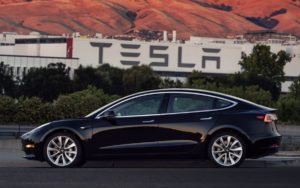
Government has freed-up £20 million to help kickstart vehicle-to-grid (V2G) development. The aim is to work out how electric vehicles can help balance the electricity system.
The Department for Business, Energy and Industrial Strategy (Beis) and the Office for Low Emission Vehicles (Olev) said money is available for three types of V2G projects:
- feasibility studies – investigating the ways vehicle to grid technology can be used in the future
- industrial research or experimental development – for example, to develop vehicle-to-grid charging equipment
- demonstrator trials in the real-world environment – projects that trial vehicle to grid technology in different locations across the country.
There are currently around 100,000 EVs on UK roads. That number is expected to swell significantly over the coming years. Manufacturers such as Volvo have grabbed headlines in recent weeks with commitments to focus entirely on electric vehicles, Tesla is launching its first mass production model and even Rolls Royce, which produces some of the biggest and best combustion engines in the world, accepts that eventually, its future business will be electric. Meanwhile, France’s policymakers have outlined a goal to ban sales of petrol and diesel cars by 2040.
With battery costs continuing to fall, some analysts now believe the EV market is approaching a tipping point, and that battery powered cars will be “cheaper to buy than internal combustion engines in most countries by 2025-29”. That analysis does not take into account any fuel savings or subsidies that may be on offer.
In the UK, Beis is keen for carmakers and battery firms to collaborate on energy storage and services in order to help decarbonise both electricity and transport sectors. While the former sector has decarbonised significantly due to subsidy regimes, the latter appears to be in reverse gear.
“The ability to marry energy and automotive [goals] is a wonderful opportunity that would be crazy to separate and dilute,” secretary of state Greg Clark said recently. “If you can create jobs in both sectors and simultaneously address problems that do not respect boundaries… that is a huge opportunity.”
Some carmakers are ahead of the curve. Nissan, second only to Jaguar Land Rover in the UK in terms of cars produced, told National Grid’s recent Power Responsive conference that it was becoming an energy services company.
Head of vehicle to grid and stationary storage at Nissan Europe, Eduardo Mascarell, said the firm wanted to leverage the power of its EVs to provide grid balancing services such as frequency response. Globally, Nissan has sold some 300,000 Leaf vehicles to date.
While V2G services via those vehicles is nascent, Mascarell said small-scale trials in Denmark suggested EV owners could earn €1,300 a year by helping to balance the grid when their cars are parked and connected.
“We believe that [V2G] is the cheapest solution to balance the grid – and the end user becomes part of the solution,” he said, earning a share of the spoils.
“The link between the car and the grid is extremely useful. The car is not just a car any more. It is a platform providing added value to the end user and to the grid.”
Related stories:
Energy storage ‘will wipe out’ battery storage
Greg Clark calls for automakers and energy industry to collaborate on battery storage
Nissan and Eaton to roll out commercial scale battery in 2017
Nissan turns on 4.75MW solar plant, eyes battery storage market
Somerset site to install ‘grid scale’ Tesla battery unit
Battery storage: Positive outlook or does a correction loom?
Tesla: People don’t engage with energy bills, but they will have to
Ofgem: Energy flexibility will become more valuable than energy efficiency
Follow us at @EnergystMedia. For regular bulletins, sign up for the free newsletter.



